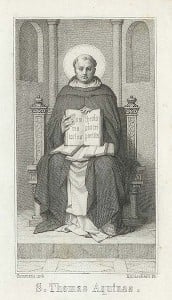 We’re blogging through St. Thomas Aquinas’ Compendium Theologiae, sometimes called his Shorter Summa. Find the previous posts here.
We’re blogging through St. Thomas Aquinas’ Compendium Theologiae, sometimes called his Shorter Summa. Find the previous posts here.
Today’s post is from Chapter 65, “Nature of the Distinction between Notional Acts and Notional Properties”.
In previous chapters, Thomas has been showing how all of the usual Scholastic metaphysical machinery applies to the Trinity: properties, acts, and so forth. God is really Three Persons, and Thomas must make metaphysical sense of this; but God is also One God, simple and without composition, and so Thomas must make sure that he doesn't apply the metaphysical machinery in a way that implies that God can be decomposed into parts. (If God could be decomposed into parts, then something must have caused those parts to be composed. God would then require a cause, and so wouldn't be God.)
Thus, Thomas clarifies:
In thus indicating the order between the notional acts and the notional properties, we do not mean to imply that the notional acts differ from the personal properties in objective reality, for they are distinct only according to our manner of conceiving.
We look at the persons of the Trinity in different ways, from different points of view, the better to understand (insofar as we can understand). But these different points of view really only reflect different ways we can think about Him; they reflect weakness of our mental vision rather than His simplicity.
Just as God’s act of understanding is God Himself understanding, so the Father’s act of begetting is the begetting Father, although the modes of signifying are different.
Having made his point, Thomas now dots his I's and crosses his T's in his usual way, running through all of the notions:
Likewise, although one divine person may have several notions, there is no composition in Him. Innascibility cannot cause any composition, since it is a negative property. And the two relations in the person of the Father, namely, paternity and common spiration, are in reality identical as referring to the person of the Father; for, as the paternity is the Father, so common spiration in the Father is the Father, and in the Son is the Son. But these two properties differ according to the terms to which they refer; for by paternity the Father is related to the Son, and by common spiration He is related to the Holy Spirit. Similarly, the Son is related to the Father by filiation, and to the Holy Spirit by common spiration.
____
photo credit: Public Domain; source Wikimedia Commons








